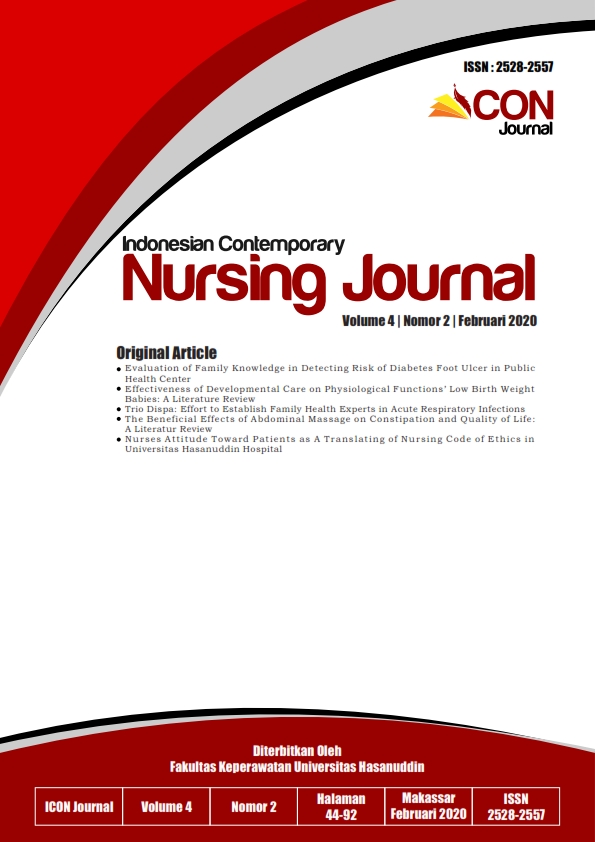Trio Dispa: Effort to Establish Family Health Experts in Acute Respiratory Infections
DOI:
https://doi.org/10.20956/icon.v4i2.4461Abstract
Introduction: Acute Respiratory Infections (ARI) is classified into non-Pneumonia (upper respiratory infection) and Pneumonia (lung or alveoli tissue) ARI. ARI is the second leading cause of death that occurs in infants in Indonesia. Trigger factors that can cause ARI include poor lighting system, unhealthy environment, incomplete infant immunization status, low infant nutritional status, low economic and maternal education status, as well as less optimal health care workers in preventing and controlling the incidence of acute respiratory distress syndrome. The study aims to determine the effectiveness of TRIO DISPA (Three colours detection and early intervention for acute respiratory infections by tabletop learning method) to increase the mother’s knowledge in identifying, interpreting and early treating of ARI symptoms disease in the working area of Pampang Public Health Centre, Makassar City. Method: This study is Quasy Experimental Design which used the Pretest-Postest without Control Group Design. The sample of this study is 20 respondents and use Wilcoxon Sign Rank Test to analyse the data. Results: The study revealed that the family caregiver shows a difference between before and after implementing the TRIO DISPA program which able to interpreted tabletop case simulation. The increase of knowledge based on the pre-post test result using the Wilcoxon test (p=0,001). Conclusion: The TRIO DISPA program can make it easier for the public to understand ARI disease and handling its signs and symptoms.
References
Boni, L. (2016). Hubungaan pemberian ASI eksklusif dengan frekuensi kejadian ISPA pada bayi usia 7-12 bulan di Wilayah Kerja Puskesmas Pampang Kota Makassar. Makassar: Fakultas Kedokteran Universitas Hasanuddin.
Cascales-Martínez, A., Martínez-Segura, M.-J., Pérez-López, D., & Contero, M. (2017). Using an Augmented Reality Enhanced Tabletop System to Promote Learning of Mathematics : A Case Study with Students with Special Educational Needs. 8223(2), 355–380. https://doi.org/10.12973/eurasia.2017.00621a
Dinas Kesehatan Provinsi Sulawesi Selatan. (2015). Profil Kesehatan Sulawesi Selatan Tahun 2014. Makassar: Dinas Kesehatan Provinsi Sulawesi Selatan.
Dinkes Kota Makassar. (2016). Profil kesehatan kota Makassar tahun 2015 . Makassar: Dinas Kesehatan Kota Makassar.
Dinkes Kota Makassar. (2018). Profil kesehatan Kota Makassar. Makassar: Dinas Kesehatan Kota Makassar.
Fatmawati, T. Y. (2017). Pengaruh pendidikan kesehatan dengan media leaflet terhadap pengetahuan ibu tentang penatalaksanaan ISPA pada balita di posyandu. Jurnal Ilmiah Universitas Batanghari Jambi, 17(3), 227–234. https://doi.org/http://dx.doi.org/10.33087/jiubj.v17i3.416
Hardita, D. M., Qur’aniati, N., & Kristiawati. (2015). Brainstorming dalam pencegahan infeksi saluran pernapasan akut (ISPA) oleh ibu. Pediomaternal Nursing Journal, 3(1), 34–42. Retrieved from https://e-journal.unair.ac.id/PMNJ/article/view/11765/6750
Khan, K. (2018). Tabletop exercise on mass casualty incident triage , does it work ? IMedPub Journals, 12(3), 566. https://doi.org/10.21767/1791-809X.1000566
Lestari, P., Paripurno, E. T., & Nugroho, A. R. B. (2019). Table Top Exercise Disaster Communication Model in Reducing Disaster Risk. Jurnal Penelitian Komunikasi, 22(1), 17–30. https://doi.org/10.20422/jpk.v22i1.587
Pelser-Carstens, V. (2019). Game Based Learning : A Tabletop Game Approach to Knowledge Application And Pervasive
Skill Acquisition. 210122. Retrieved from https://www.researchgate.net/profile/Manuel_Contero/publication/311273685_Using_an_Augmented_Reality_Enhanced_Tabletop_System_to_Promote_Learning_of_Mathematics_A_Case_Study_with_Students_with_Special_Educational_Needs/links/58406b2808ae61f75dcee422.pdf
So, M., Dziuban, E. J., Franks, J. L., Cobham-owens, K., Schonfeld, D. J., Gardner, A. H., … Chung, S. (2019). Extending the reach of pediatric emergency preparedness: a virtual tabletop exercise targetting children’s needs. (1). https://doi.org/https://doi.org/10.1177/0033354919849880
Wea, K. B., Kristiawati, & Hidayati, L. (2018). Pendidikan kesehatan dengan media audiovisual meningkatkan perilaku ibu dalam penanganan infeksi saluran pernafasan akut pada balita di kelurahan Lebijaga kabupaten Ngada. Critical, Medical and Surgical Nursing Journal, 6(2), 1–7. https://doi.org/http://dx.doi.org/10.20473/cmsnj.v6i2.12830
WHO. (2014). Revised WHO Classification and Treatment of Childhood Pneumonia at Health Facilities: Evidence Summaries. In World Health Organization. Switzerland: World Health Organization.
Downloads
Published
How to Cite
Issue
Section
License
Authors who publish with this journal agree to the following terms:Authors retain copyright and grant the journal right of first publication with the work simultaneously licensed under a Creative Commons Attribution License that allows others to share the work with an acknowledgement of the work's authorship and initial publication in this journal.
Authors are able to enter into separate, additional contractual arrangements for the non-exclusive distribution of the journal's published version of the work (e.g., post it to an institutional repository or publish it in a book), with an acknowledgement of its initial publication in this journal.
Authors are permitted and encouraged to post their work online (e.g., in institutional repositories or on their website) prior to and during the submission process, as it can lead to productive exchanges, as well as earlier and greater citation of published work (See The Effect of Open Access).
Accepted 2020-02-15
Published 2020-02-25



